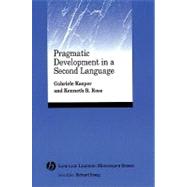
What is included with this book?
Kenneth R. Rose holds a Ph.D. in applied linguistics from the University of Illinois at Urbana-Champaign. He is an Associate Professor in the Department of English and Communication at City University of Hong Kong, where he teaches in the BATESL and MATESL programs, and supervises M.Phil. and Ph.D. students. Before coming to Hong Kong, he taught at universities in Japan and the United States. His main research interests are interlanguage pragmatics and research methods. He has co-edited one book, Pragmatics in Language Teaching (Rose & Kasper, Eds., 2001), and his work has appeared in journals such as Applied Linguistics; IRAL; JALT Journal; Journal of Pragmatics; Language, Culture and Curriculum; Language Learning; and Studies in Second Language Acquisition, as well as in a number of edited volumes.
| Chapter 1. Introduction to Second Language Pragmatic Development | 1 | (12) | |||
| Chapter 2. Theories of Second Language Pragmatic Development | 13 | (50) | |||
|
14 | (2) | |||
|
16 | (42) | |||
|
16 | (4) | |||
|
20 | (12) | |||
|
32 | (10) | |||
|
42 | (13) | |||
|
55 | (3) | |||
|
58 | (3) | |||
|
61 | (2) | |||
| Chapter 3. Approaches to Developmental Pragmatics Research | 63 | (54) | |||
|
64 | (11) | |||
|
75 | (4) | |||
|
79 | (10) | |||
|
80 | (4) | |||
|
84 | (2) | |||
|
86 | (3) | |||
|
89 | (14) | |||
|
90 | (6) | |||
|
96 | (4) | |||
|
100 | (3) | |||
|
103 | (13) | |||
|
103 | (4) | |||
|
107 | (5) | |||
|
112 | (4) | |||
|
116 | (1) | |||
| Chapter 4. Developmental Patterns in Second Language Pragmatics | 117 | (42) | |||
|
118 | (7) | |||
|
125 | (9) | |||
|
134 | (19) | |||
|
135 | (12) | |||
|
147 | (6) | |||
|
153 | (4) | |||
|
157 | (2) | |||
| Chapter 5. The Development of Pragmatics and Grammar | 159 | (32) | |||
|
160 | (3) | |||
|
163 | (11) | |||
|
163 | (4) | |||
|
167 | (1) | |||
|
168 | (6) | |||
|
174 | (11) | |||
|
175 | (5) | |||
|
180 | (2) | |||
|
182 | (3) | |||
|
185 | (4) | |||
|
189 | (2) | |||
| Chapter 6. Learning Context and Learning Opportunities | 191 | (46) | |||
|
192 | (5) | |||
|
197 | (11) | |||
|
197 | (8) | |||
|
205 | (3) | |||
|
208 | (9) | |||
|
217 | (13) | |||
|
220 | (10) | |||
|
230 | (4) | |||
|
234 | (3) | |||
| Chapter 7. The Role of Instruction in Learning Second Language Pragmatics | 237 | (38) | |||
|
238 | (2) | |||
|
240 | (3) | |||
|
243 | (5) | |||
|
248 | (2) | |||
|
250 | (5) | |||
|
255 | (4) | |||
|
259 | (10) | |||
|
269 | (4) | |||
|
273 | (2) | |||
| Chapter 8. Individual Differences in L2 Pragmatic Development | 275 | (30) | |||
|
276 | (16) | |||
|
278 | (2) | |||
|
280 | (3) | |||
|
283 | (5) | |||
|
288 | (4) | |||
|
292 | (10) | |||
|
302 | (3) | |||
| Chapter 9. Epilogue | 305 | (8) | |||
| References | 313 | (28) | |||
| Index | 341 |
The New copy of this book will include any supplemental materials advertised. Please check the title of the book to determine if it should include any access cards, study guides, lab manuals, CDs, etc.
The Used, Rental and eBook copies of this book are not guaranteed to include any supplemental materials. Typically, only the book itself is included. This is true even if the title states it includes any access cards, study guides, lab manuals, CDs, etc.